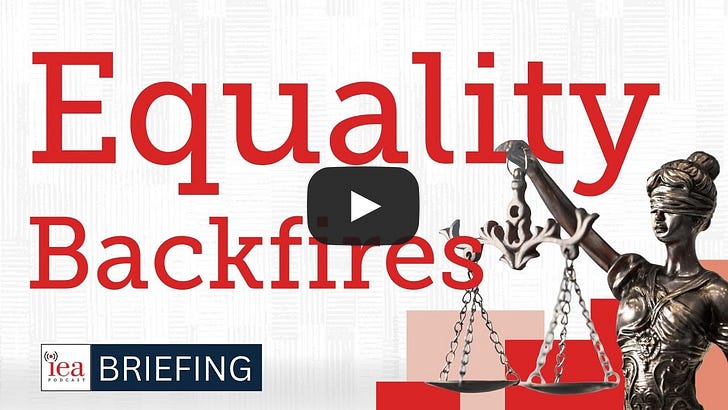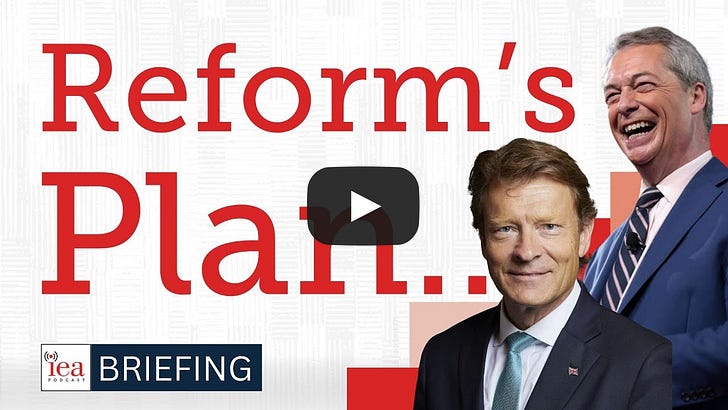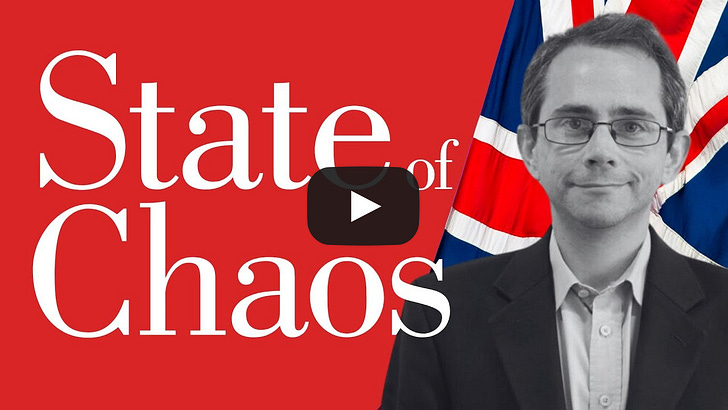|
 |
In today’s newsletter:
Should we build new towns?
New Paper: What should we do with anti-discrimination laws?
Public sector pensions
On the podcast: New towns, Reform’s energy policy, and public sector productivity.
and more….
My IEA Discussion Paper “Home Win”, published in April 2024, is set in the year 2035, in a version of the future in which Britain has successfully solved its housing crisis. The narrator is situated in a fictional new borough called “London-Beavertown”, which I imagined to be somewhere in the southeast of London, on what is currently scrubland in the London Green Belt.
Judging from Prime Minister Starmer’s latest announcements on Thursday, there is now a decent chance that we are going to see actual, real-world Beavertowns in the not-too-distant future.
It was in May 2024 when Angela Rayner, who would become Housing Secretary two months later, first announced her intention to revive the postwar New Towns programme. This was not in itself a groundbreaking announcement. Under a different name, David Cameron had already flirted with similar ideas, and so had Gordon Brown before him. Nothing ever came of it.
But this time, the plans are more advanced than their failed – or rather, prematurely aborted – predecessors were. The government is already looking at about 100 potential sites for their New Towns, and later this year, they want to select up to a dozen, where construction is supposed to begin before the end of this parliament. Each New Town is supposed to house a population of about 10,000 people or more.
The original New Town programme was, of course, a mixed bag. The evidence shows that the most successful examples were the ones that were, in effect, just extensions of already existing urban settlements, rather than completely new ones. Judging from the Guardian’s reporting, though, the Starmer government’s New Towns are likely to fall into that category. They are not taking the “New” in “New Towns” too literally. From the sound of it, some may even just literally be urban extensions, albeit introduced in a slightly roundabout way. Starmer did not even rule out that one or two of them could be built on the Green Belt. So imagine an urban extension of London on Green Belt land – that would basically be Beavertown.
For me, this is very much an “I wouldn’t start from here” situation. Ideally, I would not want central government to be involved in this kind of town planning at all. I do not want central planning of urban development, be it for New Towns or otherwise. I do not want politicians to point at maps, deciding where new developments should go, or what their design code should look like. That is why my fictitious “YIMBY” government in “Home Win” ultimately transcends the logic of the current planning system altogether.
But we are starting from here, and in the current context, almost any kind of development is better than none. So for now – let’s build Beavertown!
Kristian Niemietz
Editorial Director
P.S. The best way to never miss out on IEA work, get access to exclusive content, and support our research and educational programmes is to become a paid IEA Insider.
IEA Podcast: Executive Director Tom Clougherty, Editorial Director Kristian Niemietz, and Communications Manager Reem Ibrahim discuss the Government’s plan for new towns, Reform’s energy policy, and public sector productivity, IEA YouTube.

Strip back the Equality Act to better protect genuinely disadvantaged, says new IEA Report
Liberalising Discrimination Law, by Daniel Freeman and Alex Morton
Over the past six decades our political, philosophical and legal approaches to discrimination have evolved, moving from a laissez-faire attitude to complex legislation that addresses both ‘direct’ and ‘indirect’ discrimination.
Treating people differently based on characteristics beyond their control is illiberal, divisive, and fails to help those who are genuinely disadvantaged.
UK equality legislation has evolved beyond preventing direct discrimination to actively promoting different treatment based on group identities.
The Equality Act should be stripped back to focus solely on preventing direct discrimination. It should return to the roots of earlier legislation, by outlawing direct discrimination focused on individuals rather than remove or reduce gaps between groups. The rest of the Act should be removed from the statute books.
This would be a genuinely liberal but strong anti-discrimination agenda.
Alex Morton, former Director of Strategy at the Institute of Economic Affairs said:
“People should be treated as individuals in a liberal society. The Equality Act does not achieve this and instead in parts promotes group identities in a divisive way. It should be stripped back to only outlaw direct discrimination.”
Daniel Freeman, Managing Editor at the Institute of Economic Affairs said:
“Anti-discrimination law was initially intended to shield individuals from unfair acts of direct discrimination but over recent decades it has dramatically widened in scope and ambition. It can increasingly be used as a tool to engineer social outcomes in ways that are illiberal and at times discriminatory. If politicians wish to reverse this mission creep the Equality Act will need to be reformed.”
EXPOSED: How Anti-Discrimination Laws Are Actually Creating MORE Discrimination | IEA Briefing, Managing Editor Daniel Freeman and Communications Manager Reem Ibrahim, IEA YouTube

Managing Editor Daniel Freeman appeared on GB News to discuss the paper.
News, Views & Upcoming Events
Will Reform UK’s energy Policies cut prices?, Energy Analyst Andy Mayer and Communications Manager Reem Ibrahim, IEA YouTube

Football doesn’t need a regulator, Editorial and Research Fellow Len Shackleton, The Spectator
The UK must resist retaliating to Trump's tariffs and stick to a policy of free trade for economic growth, Communications Manager Reem Ibrahim, LBC
The Uncomfortable Truth About Why British Government Is Failing, Executive Director Tom Clougherty and Sam Freedman, IEA YouTube

The former British colony that rid itself of gilded public sector pensions – and thrived, Communications Manager Reem Ibrahim quoted in the Telegraph
“In Singapore, the government has integrated public sector pensions with the national system, controlling their future liabilities and introducing more transparency into the system. However, this is almost impossible to do in the UK. Unlike Singapore, our public sector workers are heavily unionised and will strike at the drop of a hat.
“The increasing cost of public sector pensions places an unfair and unsustainable amount of pressure on taxpayers, as well as crowding out funding for other areas of government spending. We should focus on reducing the size of the public sector as a whole.”
The Government shout be in favour of drilling the gas under our feet – not blocking it, Energy Analyst Andy Mayer writes in The Telegraph
You’re currently a free subscriber to Insider. For the full experience, upgrade your subscription.
Paid subscribers support the IEA's charitable mission and receive special invites to exclusive events, including the thought-provoking IEA Book Club.
We are offering all new subscribers a special offer. For a limited time only, you will receive 15% off and a complimentary copy of Dr Stephen Davies’ latest book, Apocalypse Next: The Economics of Global Catastrophic Risks.









![[INVITATION] Labour Reimagined: Policies for the Future of Work?](https://substackcdn.com/image/fetch/w_1300,h_650,c_fill,f_auto,q_auto:good,fl_progressive:steep,g_auto/https%3A%2F%2Fsubstack-post-media.s3.amazonaws.com%2Fpublic%2Fimages%2F90c3d22c-bd3c-4a62-b3b6-5c6f74ab65ad_1920x1080.png)
